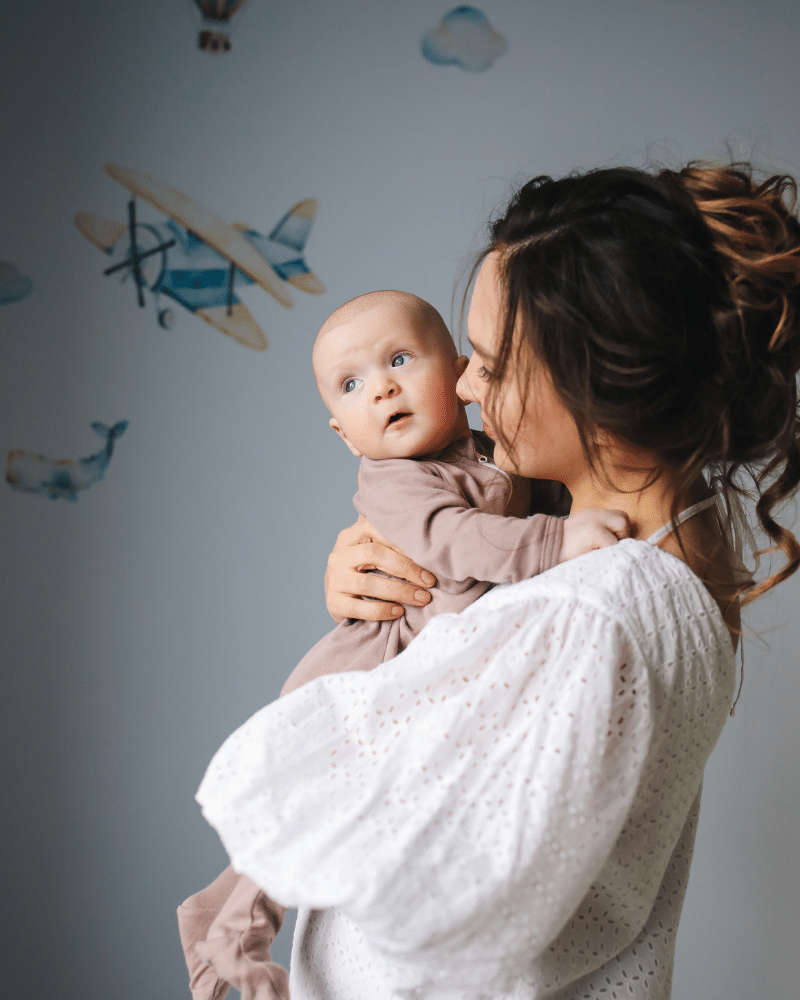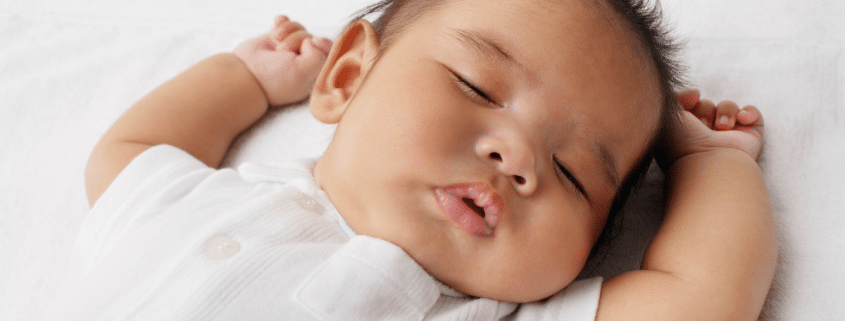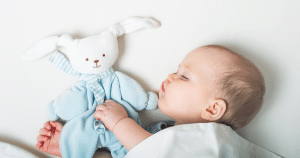Why is my baby sleeping with their mouth open?
As a new parent, you might find yourself looking up answers to many questions. Your baby’s sleep can change a lot while they are younger. In this blog, we’re answering the question, why is my baby sleeping with their mouth open?
This blog includes:
- Baby sleeping chart
- Is it normal for babies to keep their mouth open during sleep?
- What if my newborn sleeps with mouth open but breathes through nose?
- Why does my baby sleep with her/his mouth open?
- Signs that your baby sleeps with mouth open
- Frequent mouth breathing treatment
Baby sleeping chart
Here is an average guide to how much sleep your baby needs in a full day. Don’t forget that all babies are different, and some babies will need more sleep than others. If your baby sleeps a little more or less, there’s likely nothing to worry about.
If you notice that your baby is sleeping much more or less than what’s expected of their age group, seek advice. A sleep expert will be able to help you and offer advice. It doesn’t always mean there’s something wrong.
- Newborns may sleep up to 16 hours 30 minutes daily
- One-month-old babies may sleep between 14 hours – 16 hours daily
- Three-month-olds may sleep between 14 hours – 16 hours daily
- Six-month-olds may sleep up to 14 hours daily
- Nine-month-olds may sleep up to 13 hours and 30 minutes daily
- 12-month-old babies may sleep up to 13 hours 30 minutes daily
Sleep is very important for your new baby. In the early stages of their life, they’ll likely be asleep for longer than they’re awake. It’s a good idea to put together a nap schedule for your baby.
Check out our sleep schedule guides:
Is it normal for babies to keep their mouth open during sleep?
Ahh seeing your baby sleeping peacefully definitely brings relief, but it’s important to monitor them too. If you’ve noticed your baby sleeping with their mouth open, there could be a reason for it. This is usually referred to as mouth breathing in babies.
Most babies will sleep with their mouths shut, allowing them to breathe easily through their noses. If your baby is breathing through their mouth, something might not be quite right. It could be a sign that your baby’s nose is blocked.
Don’t forget that it’s worth monitoring your baby’s sleep over time. Noticing them sleeping with their mouth open just once may not be anything to worry about. It’s good to check this over a period of time. Then, you can identify what’s ‘normal’ for your baby.
What if my newborn sleeps with mouth open but breathes through nose?
For a newborn, this can be quite normal. Babies tend to breathe only through their noses for a while when they’re born. This is because it can take them a couple of months before they learn the mouth-breathing reflex.
Typically, babies can only breathe through their mouths when they are crying. If you’re not sure, you should always seek professional advice. They will know best and be able to give you the most accurate information regarding mouth breathing. A doctor may ask you some questions and also conduct some tests to help them come to a conclusion.

Why does my baby sleep with her/his mouth open?
There are many reasons why your baby might sleep with their mouth open. It’s a good idea to monitor if you notice mouth breathing. However, if you notice that your baby is unwell, seek advice immediately.
Nasal congestion
Sometimes we all experience some congestion. As we get older, it’s much easier to deal with. For babies, who can’t let you know, it can be harder to deal with stuffy noses.
Congestion is essentially mucus that is sat in the way. It has usually dried up. Due to babies having small nostrils, it’s harder for them to breathe through their nose and can lead to mouth breathing.
Cold/Stuffy nose
Babies can suffer from the occasional cold just like adults do. Colds again can cause congestion as mucus collects. Babies don’t know how to blow their noses, so the excess mucus tends to stay put and dry up, causing a stuffy nose. You may find using a gentle tissue dipped in a small amount of water helps to clear the nostrils.
Allergies
Babies can develop allergies that can cause many symptoms. One common symptom is higher mucus production. If the mucus is not cleared, it can dry up and block the passageway very easily. A blocked nasal passage can cause breathing difficulties for babies, leading to mouth breathing.
Tongue tie
Some babies are born with a tongue tie. Tongue-tied newborns usually cannot touch the roof of their mouth with their tongue. This can make it difficult for the baby to feed as they struggle with the suckling motion.
If your baby has a tongue tie, they may take to mouth breathing when sleeping. When babies are first born, checking for tongue ties is part of their physical exam. However, it is not always a straightforward spot and, therefore, can be found at a later date. Speak to a medical professional if you suspect that your baby has a tongue tie.
Sleep apnea mouth breathing
Sleep apnea is a condition whereby your baby stop starts breathing in their sleep. There are different types of sleep apnea, so seeing a doctor is essential if you suspect it. Sleep apnea can often lead to snoring and can make the baby wake themselves up. In babies, sleep apnea can often be caused by enlarged tonsils that are blocking the baby’s airways. This can be referred to as obstructive sleep apnea.
You should seek advice if you believe your baby may have sleep apnea, as it can have further issues. Here are some sleep apnea signs to look for:
- Regular waking in sleep
- Sleep terrors
- Choking/coughing
- Excessively tired even with enough sleep
If you’ve noticed that your baby is regularly sleeping with their mouth open, you should seek advice. A doctor will assess your baby’s habits and come to a conclusion. It could also be a sign of a deviated septum. See a doctor if you suspect this or have any concerns about your baby’s health.

Signs that your baby sleeps with mouth open
Babies sleeping with their mouths open could lead to them having a dry throat which is also uncomfortable.
Sometimes it can be harder to spot that your baby sleeps with their mouth open instead of nose breathing. Especially as you won’t be watching them all night. You can also look out for these signs of mouth breathing:
- Drooling
- Snoring
- Grinding teeth
- Snorting while crying
- More tired than usual/restless sleep
If you notice any other symptoms, be sure to note them down. Seek immediate advice if your baby is having trouble breathing.
Your baby may constantly be kicking their legs and moving arms, you can read our blog to find out why.
Frequent mouth breathing treatment
The treatment for your baby’s mouth breathing will depend on what the issue is. If the doctor suspects allergies, they will do further testing. If allergies are confirmed, the baby may be given medication to manage the allergy symptoms.
For older babies, a doctor may work on breathing techniques and maintaining good tongue posture. This can help to encourage nasal breathing. They may let you know about various tongue and mouth muscles to reduce open-mouth breathing during sleep.
A tongue tie is treated by the doctor making a small cut in the tissue that connects the tongue to the bottom of the mouth. This will allow the baby to move their tongue more easily.
We hope this article has been helpful and answered the question, why is my baby sleeping with their mouth open? We recommend seeking advice if you notice that your baby is regularly sleeping with their mouth open. A medical professional will give you the best advice and conduct testing to identify any issues with your baby’s mouth breathing. Seek immediate advice if your baby is having difficulty breathing.
Hey there, I’m Abigail!
In 2022, I graduated with a First Class Degree in Marketing and since then, I have been working as a blogger and Marketing Assistant. Before heading to university, I also achieved a BTEC in Children’s Play, Learning and Development.
I have been blogging for over four years and have covered many topics during this time. My focus has been on pregnancy, babies, sleep and baby name ideas.
I am passionate about learning new things and helping others. I hope that you find my blogs useful and informative. See you in the next article!


















